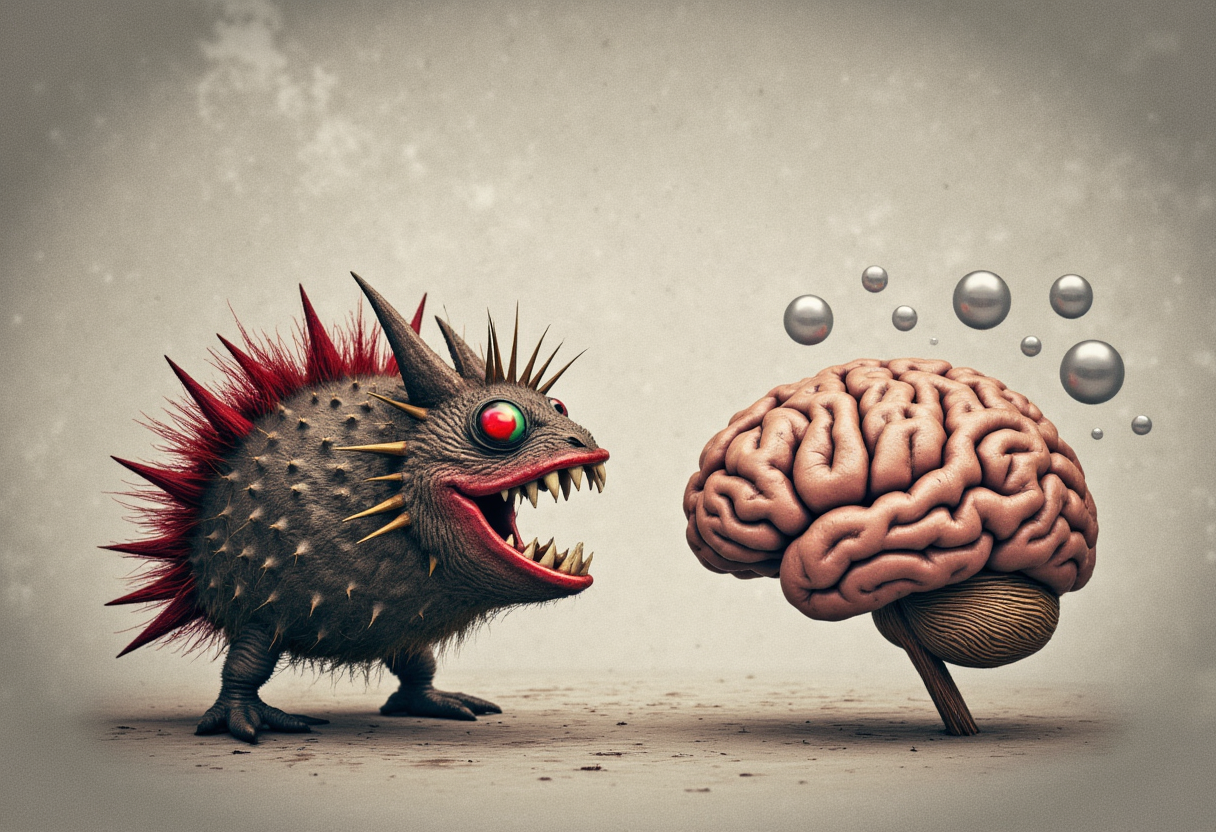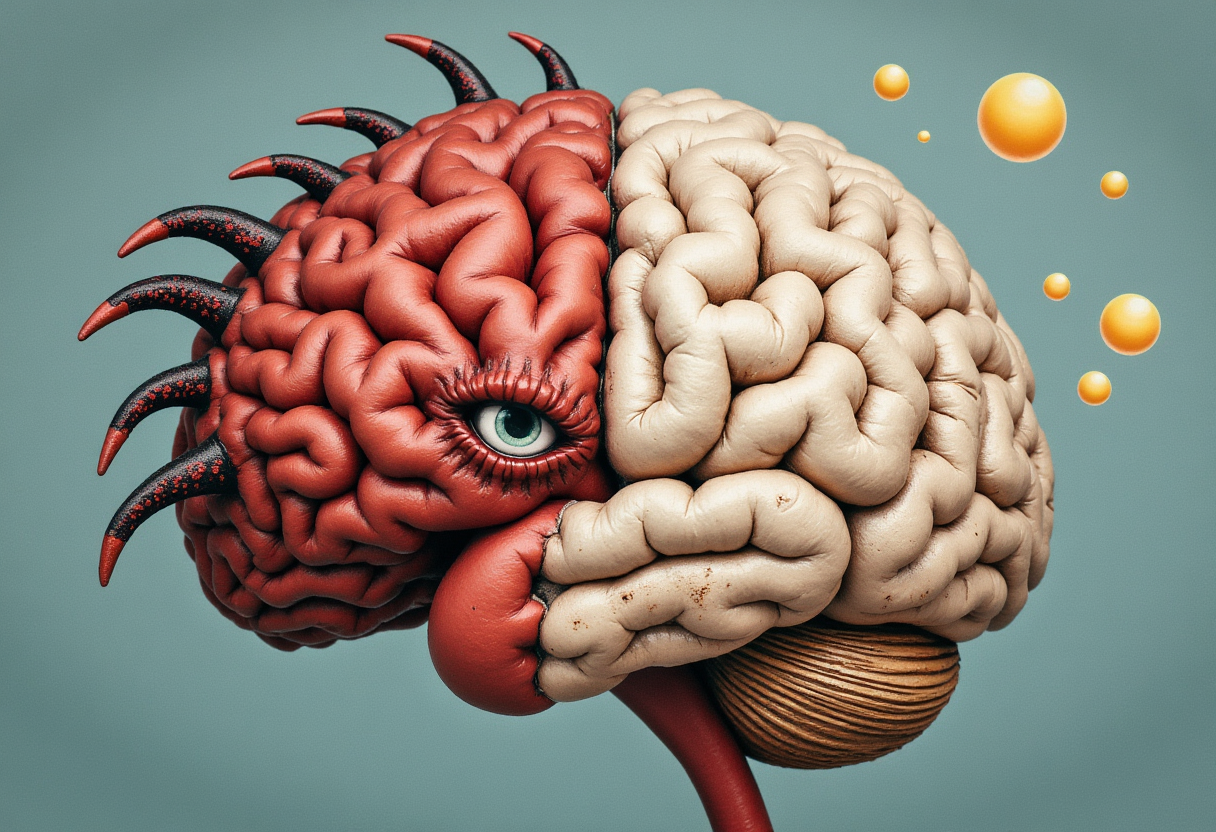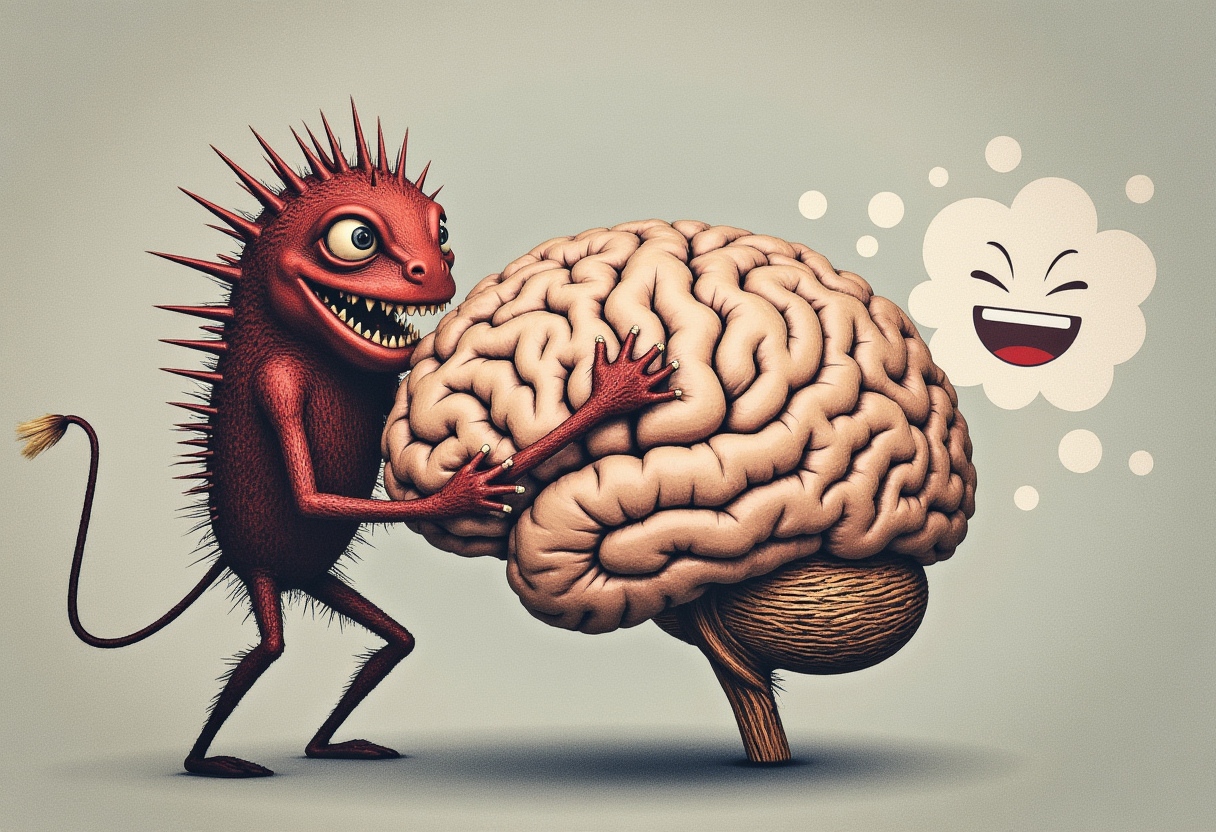Laugh Lines & Fault Lines: The Psychology of Humor (and Why We Need It Now)
Some say laughter is the best medicine. Around here—especially when the humidity climbs before noon—we joke that it’s cheaper than therapy, can burn a few extra calories during a full-belly laugh, and keeps us from yelling at squirrels, tourists, or the lizard doing push-ups on the porch.
Seriously, those lizards are judging us.
But the psychology of humor shows it’s more than comic relief: humor is a mental-health multivitamin and a social lubricant that helps people cope, connect, and sometimes even recover faster from stressful episodes (see research summaries below).
A perfectly timed joke, a groan-worthy pun, or a story that makes you snort can change how you process stress, strengthen relationships, and help you bounce back from life’s Category 5 moments—both literal storms and the metaphorical ones. Read on to learn the science, the strategies, and whether dark humor helps or hurts.
We’re talking about the full range of laughter: the gut-busting guffaws that leave you breathless and the small, knowing chuckles that acknowledge the absurdity of being alive—both of which serve a purpose in everyday life.
😄 Humor as a Psychological Superpower: Your Invisible Cape Against the Absurd
Researchers studying the psychology of humor have spent decades examining why people laugh and what laughter does for us — and the answers matter for mental health, relationships, and everyday well-being.
Humor has many layers: it helps people cope with difficulty, showcases character strengths, and acts as social glue that brings strangers together.
A humorous and slightly surreal image depicting an unexpected contradiction. For example, a majestic alligator wearing a tiny, perfectly fitted flamingo pink sombrero, calmly floating in a sparkling, bright blue kiddie pool in a suburban Florida backyard.
Coping Mechanism: Humor helps reframe stressful moments so they feel less overwhelming. A little levity can interrupt anxious thought patterns and make a problem feel more manageable — not by denying pain, but by giving it a different, less threatening meaning.
Character Strength: Positive psychology lists humor among universal strengths that support resilience, along with curiosity and gratitude. People who regularly use adaptive humor tend to report higher life satisfaction and greater emotional flexibility (see sources below).
Social Glue: Shared laughter strengthens bonds and builds trust. When you laugh with someone, you signal a shared perspective — a recognition of the absurdities you both see — which speeds relationship-building and lowers social tension. That’s why a well-timed joke can turn awkward silence into instant rapport.
Practical takeaway: Use humor intentionally. Try one simple experiment today — tell a light, self-deprecating anecdote or point out something harmlessly absurd in a situation — and notice whether it eases tension or opens conversation.
Humor isn’t a magic fix, but the psychology of humor shows it’s a versatile tool people can use to cope, connect, and thrive in a noisy, often ridiculous world.
🛠️ Theories, Tactics & Ticklish Truths: Dissecting the Funny Bone
Let’s break humor down like a lively (and slightly irreverent) academic panel — think professors in Hawaiian shirts swapping hypotheses between sips of coffee. Theories of humor give us a framework for why things make us laugh and how laughter serves us in daily life.
🎭 Theories of Humor: Why Does That Make Me Giggle?
Relief Theory. Classic formulations (Freud and others) propose that laughter releases built-up psychological tension. In practice, this explains nervous giggling, the big laugh after a near-miss, or why we sometimes laugh at awkward, uncomfortable moments — it’s a physiological “phew” that relieves stress. Contemporary research ties this to reductions in reported tension and shifts in mood.
Brain's Fight Club): An artistic, metaphorical representation of the brain. On one side, a "stress" monster (perhaps spiky, red, or dark) is being playfully fended off or punched by a "laughter"
Incongruity Theory. This idea says humor springs from surprise or a mismatch between expectation and reality: your brain spots two incompatible patterns and resolves them in a way that’s pleasurable.
Examples include absurd images, clever wordplay, or jokes that pivot on an unexpected twist. Modern cognitive accounts link incongruity detection to pleasure centers in the mind and show how benign violations — things that are wrong but not threatening — often produce laughter.
Superiority Theory. Dating back to thinkers like Hobbes, this theory holds we sometimes laugh from a sense of superiority — a brief boost when someone else's small misfortune reminds us it could have been worse. This explains slapstick and pratfalls,
but it’s important to distinguish malicious schadenfreude from lighthearted, shared amusement that reinforces group bonding.
💪 18 Ways Humor Acts as a Strength: Your Emotional Swiss Army Knife
Research and clinical observation suggest humor functions across many domains. Below are concise ways humor serves people — each line pairs the function with a quick practical note or evidence cue where relevant.
1. Reframe failure: Turn setbacks into stories; reframing reduces rumination and makes future attempts easier.
2. Regulate emotion: A well-timed laugh can interrupt an anxiety spiral and reset emotional tone (studies indicate short-term mood benefits).
3. Navigate grief: Shared, compassionate humor can honor loss while allowing emotional expression — often seen in bereavement groups.
4. Build resilience: Habitual humor use correlates with greater psychological flexibility in stressful contexts.
5. Boost creativity: Playful thinking loosens rigid patterns and helps generate novel ideas (experimental studies support this link).
An artistic, metaphorical representation of the brain.
6. Improve communication: Levity can soften difficult messages and increase receptiveness.
7. Reduce conflict: Humor diffuses tension and opens pathways to reconciliation when used sensitively.
8. Enhance problem-solving: Relaxed, playful states encourage lateral thinking and unexpected solutions.
9. Increase optimism: Humor often reframes events as less catastrophic, fostering hopeful outlooks.
10. Strengthen relationships: Shared laughter builds rapport and signals shared perspective (social psychology research documents this process).
11. Improve physical health: Some studies report short-term immune benefits and lower pain perception after laughter, though results vary and more research is needed.
12. Promote self-compassion: Laughing at one’s mistakes reduces self-criticism and helps learning from error.
13. Inspire courage: Joking about fears can make them feel less daunting and encourage approach behavior.
14. Cultivate presence: Humor anchors attention in the moment, pulling you out of rumination.
15. Offer perspective: What feels catastrophic now may become a funny anecdote later; perspective-taking reduces catastrophizing.
16. Reduce stress hormones: Laughter episodes have been associated with transient reductions in cortisol in some studies — a physiological pathway for stress relief.
17. Increase pain tolerance: Experimental work shows humor and laughter can raise pain thresholds for some people (useful adjunct to coping strategies).
18. Make life more enjoyable: Beyond measurable benefits, humor simply increases pleasure and meaning — an outcome in its own right.
Quick examples: a therapist encouraging reappraisal by using gentle humor; a team using a light joke to de-escalate a tense meeting; emergency responders using gallows humor to process traumatic events (context matters). When citing physical effects (immune markers, cortisol, pain tolerance), note that findings are mixed and often short-term; link to current reviews if adding references.
Bottom line: theories (relief, incongruity, superiority) explain different routes to laughter, and research suggests humor serves as a practical psychological tool — useful for coping, bonding, creativity, and, sometimes, modest physical benefits. Use humor intentionally and ethically, and it will repay you in resilience, connection, and yes, more moments that make you laugh.
🌀 Humor vs. Stress: Your Brain's Favorite Fight Club (Where Laughter Always Wins)
There’s good evidence that laughter affects stress physiology: many studies report short-term reductions in cortisol (the stress hormone) and transient increases in dopamine and endorphins, the neurotransmitters tied to pleasure and pain relief (research reviews summarize mixed but promising results).
Think of a laugh as a tiny reset for your nervous system — heart rate and breathing speed up briefly during a hearty chuckle, then slow and relax, and muscles that tensed release. The result? A calmer, clearer mindset and a little distance from whatever was triggering you.
Regularly using humor is more than a quick fix; it’s a preventative habit that builds emotional resilience over time. In practical terms, humor is a low-cost tool people can use to manage daily frustrations and maintain mental health.
🔦 Exploring Your Inner Smart-Alek: 6 Ways to Work That Funny Bone (No Gym Membership Required)
You don’t need to be a professional comedian to use humor intentionally. Try this short, science-friendly pack of exercises — treat them like micro-experiments and note how your mood or interactions change.
1. Journal Your Weird. Turn a stressful moment into a short sitcom scene in writing. Reframing an experience this way shifts the emotional weight and trains your brain to spot absurdity (use daily for a week).
2. Start a “Silly Wins” Log. Each day write one small comedic victory — anything from a successful parking job to a meme that made you snort. This practice builds positive attention and counters negativity bias.
3. Collect Comebacks. Prepare three light, clever responses for awkward moments (not insults). Having these ready reduces social anxiety and can defuse tension.
group of people is sitting on a porch or beach, laughing heartily while holding refreshing Florida drinks (iced tea, orange juice, or a cocktail with a tiny umbrella).
4. Try Situational Reframing. When something goes wrong, mentally label it as “material” — a story you’ll tell later. This cognitive shift reduces immediate dread and promotes curiosity instead of catastrophizing.
5. Watch Comedy With Others. Shared laughter multiplies the social benefit. Pick a short comedy clip or sitcom episode to watch with a friend and notice how it changes conversation and connection.
6. Use Empathy-Driven Humor. In heavy moments, aim for gentle, inclusive levity that acknowledges feelings first. This kind of humor supports relationships and care, rather than minimizing pain.
Research note: physiological claims (cortisol, dopamine, endorphins, heart rate patterns) are supported by several studies but effects are often short-term and variable across people — humor’s psychological benefits (mood, perspective, social bonding) have more consistent support in the literature.
Quick micro-experiment: pick one of the six exercises to try today (Journal, Silly Wins, or Watch Comedy With Others). Afterward, jot one sentence about whether it changed your mood or interaction. Small, repeatable practices are the best way to build a habit that uses humor as a reliable tool.
🐊 What About Dark Humor? The Goth Kid of Comedy
Dark humor sits at the intersection of grief, absurdity, and survival. For some people, it provokes shock; for others, it’s a quiet recognition that laughter can coexist with pain.
Is it healthy?
The short answer: it depends. For many—especially professionals who face trauma (e.g., emergency responders)—dark humor can function as a pressure valve, a way to process horrific experiences without becoming overwhelmed. Qualitative research and first-responder interviews often describe gallows humor as bonding and emotionally regulative in context.
a single, strong palm tree standing firm against a receding, dark hurricane cloud. On one of the palm fronds, a small, vibrant, and slightly mischievous cartoon 'smile' or 'wink' is subtly incorporated
In other cases, habitual use of morbid jokes can signal avoidant coping: if every reaction is a punchline and serious feelings are never addressed, that may be a red flag for deeper distress. Context matters: audience, timing, and intent determine whether dark humor connects or alienates.
Adaptive vs. maladaptive example: An ER team uses a grim joke after a difficult shift to release tension and then debrief—adaptive, because it’s paired with peer support.
By contrast, someone who jokes about their trauma to deflect all conversations about it and avoids help is maladaptive and a reason to seek support.
When to seek help: If humor consistently masks hopelessness, prevents you from talking about feelings, or isolates you from others, consider reaching out to a mental health professional. Dark humor can be a useful tool, but it shouldn’t replace other coping strategies like social support, therapy, or healthy routines.
Use dark humor thoughtfully: it can be a powerful tool for processing heavy experiences, but balance it with other approaches to mental health and be mindful of how it affects you and the people around you.
🌴 Final Laugh: Your Prescription for a Joyful Life (Side Effects May Include Snorting)
Living in Florida gives us plenty of practice: hurricanes, relentless heat, and the occasional giant reptile in the garage that might be the neighbor’s missing iguana. Those local absurdities are great reminders that humor helps us cope—and it also helps us connect.
When used intentionally, humor transforms the unbearable into something bearable and the mundane into a shared story.
A belly laugh under the palm trees, a dry smirk at the latest headline, or a shared chuckle with a neighbor all reinforce resilience: laughter signals, internally and socially, that you can handle more than you think.
Try one small experiment this week: pick any one of the six exercises above (Journal Your Weird, Silly Wins, or Watch Comedy With Others) and notice how it shifts your mood or your conversations. Share the result with a friend,
Or drop a line in the comments — small practices compound into lasting habits that use humor as a practical tool for well-being.
For more on the science and stories behind laughter, check out the books and reviews linked below. The psychology of humor isn’t just entertaining theory—it’s a usable approach to living with more joy, resilience, and connection. Go on, be funny; the world needs your laugh lines.
"Thanks for reading. Until next time, keep exploring Florida's peculiar charm!"
Florida Unwritten Staff
Earl Lee







